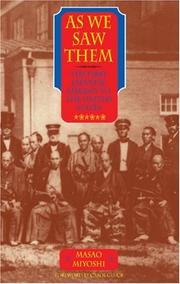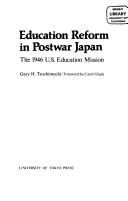| Listing 1 - 10 of 20 | << page >> |
Sort by
|

ISBN: 0691054495 0691008124 Year: 1985 Publisher: Princeton Princeton university press
Abstract | Keywords | Export | Availability | Bookmark
 Loading...
Loading...Choose an application
- Reference Manager
- EndNote
- RefWorks (Direct export to RefWorks)
Ideology played a momentous role in modern Japanese history. Not only did the elite of imperial Japan (1890-1945) work hard to influence the people to "yield as the grasses before the wind," but historians of modern Japan later identified these efforts as one of the underlying pathologies of World War II. Available for the first time in paperback, this study examines how this ideology evolved. Carol Gluck argues that the process of formulating and communicating new national values was less consistent than is usually supposed. By immersing the reader in the talk and thought of the late Meiji period, Professor Gluck recreates the diversity of ideological discourse experienced by Japanese of the time. The result is a new interpretation of the views of politics and the nation in imperial Japan.
Ideology --- Idéologie --- Japan --- Japon --- History --- Histoire --- J3371 --- J3375 --- J4000.70 --- J4122 --- J4010 --- J4600.70 --- Knowledge, Theory of --- Philosophy --- Political science --- Psychology --- Thought and thinking --- Japan: History -- Kindai, modern -- Meiji period (1868-1912) --- Japan: History -- Kindai, modern -- Taishō period (1912-1926) --- Japan: Social history, history of civilization -- Kindai (1850s- ), bakumatsu, Meiji, Taishō --- Japan: Sociology and anthropology -- nationalism --- Japan: Social sciences in general -- ideology, socio-political and socio-economic movements --- Japan: Politics and law -- history -- Kindai (1850s- ), bakumatsu, Meiji, Taishō --- -Ideology. --- Ideology. --- -Ideology --- Idéologie --- Nihon --- Nippon --- Iapōnia --- Zhāpān --- I︠A︡ponii︠a︡ --- Yapan --- Japão --- Japam --- Mư̄ang Yīpun --- Prathēt Yīpun --- Yīpun --- Jih-pen --- Riben --- Government of Japan --- 日本 --- 日本国 --- Nipponkoku --- Nippon-koku --- Nihonkoku --- Nihon-koku --- State of Japan --- Япония --- Japani --- اليابان --- al-Yābān --- يابان --- Yābān --- Japonsko --- Giappone --- Japonia --- Japonya --- Ideologie --- 15.75 history of Asia. --- Ideologie. --- Ideología. --- Meiji, --- Japan. --- Jepun --- Yapon --- Yapon Ulus --- I︠A︡pon --- Япон --- I︠A︡pon Uls --- Япон Улс --- Contribution au concept d'idéologie --- Idéologies, Théorie des --- Théorie des idéologies --- Croyance --- Idées politiques --- Idéologie et art --- Idéologie et cinéma --- Idéologie et historiographie --- Idéologie et langage --- Idéologie et littérature --- Idéologie et sciences --- Idéologie et sciences sociales --- Idéologues --- Opinion --- Valeurs sociales --- Philosophie politique --- Philosophie sociale --- Théorie de la connaissance --- philosophie --- philosophie française --- I͡Aponii͡ --- Kai (Japon ; province) --- Hokkaidō (Japon) --- Honshū (Japon) --- Kyūshū (Japon) --- Shikoku (Japon) --- Okinawa (Japon ; région) --- Asie orientale --- Antiquités --- Conditions sociales --- Divisions politiques et administratives --- Abe Isoo (1865-1949). --- Aizawa Seishisai. --- Asia: expansion in. --- Barraclough, Geoffrey. --- Burke, Edmund. --- Chinese learning. --- Emperor Kammu. --- European models. --- German models. --- Hibiya riots. --- Home Ministry (Naimushō). --- Japanism (Nihonshugi). --- Keiō University. --- Kenseikai. --- Kusunoki Masashige. --- Marx, Karl. --- agrarian myth. --- ancestor worship. --- ancestral customs. --- bushidō. --- capitalism. --- censorship. --- centralization. --- civic values. --- civilization. --- communications. --- demonstrations. --- draft evasion. --- economy (the). --- education. --- factory workers. --- farmers. --- foreign policy. --- frugality. --- grammar of ideology. --- hierarchy. --- household industry. --- ideological process. --- imperialism. --- individualism. --- international relations. --- land ownership. --- libraries. --- local associations. --- magazines. --- manners. --- militarism, militarists. --- nationalism. --- parliamentary ideology. --- pocketbooks. --- Ōsaka.
Book
Year: 1993 Publisher: New York (N.Y.) New York public library
Abstract | Keywords | Export | Availability | Bookmark
 Loading...
Loading...Choose an application
- Reference Manager
- EndNote
- RefWorks (Direct export to RefWorks)
Book
ISBN: 9780691232676 Year: 2021 Publisher: Princeton, NJ
Abstract | Keywords | Export | Availability | Bookmark
 Loading...
Loading...Choose an application
- Reference Manager
- EndNote
- RefWorks (Direct export to RefWorks)
Digital
ISBN: 9780691232676 Year: 2021 Publisher: Princeton, N.J. Princeton University Press
Abstract | Keywords | Export | Availability | Bookmark
 Loading...
Loading...Choose an application
- Reference Manager
- EndNote
- RefWorks (Direct export to RefWorks)

ISBN: 1589880234 9781589880238 Year: 2005 Publisher: Philadelphia Paul Dry Books
Abstract | Keywords | Export | Availability | Bookmark
 Loading...
Loading...Choose an application
- Reference Manager
- EndNote
- RefWorks (Direct export to RefWorks)
An entertaining and adventurous story of discovery, this historical rendering presents the Japanese experience of American culture based on the records and travelogues of Japanese envoys sent to the United States in 1860. Scores of samurai left copious records of the event, detailing the travelers' accounts of shopping at Tiffany's and some disturbing encounters with xenophobia. Illuminated are the startling beginnings of the attitudes and judgments that have helped form American and Japanese perceptions of each other ever since. This retrospective aims at a more precise understanding of the similarities and differences between Japanese and Westerners, providing a revealing critique of the roots of intolerance, and offering continued efforts at international and intercultural understanding.
Manʼen Gannen Kenbei Shisetsu (Japan) --- United States --- Japan --- Relations --- Foreign relations

ISBN: 1563242648 1563242656 Year: 1997 Publisher: Armonk, N.Y Sharpe
Abstract | Keywords | Export | Availability | Bookmark
 Loading...
Loading...Choose an application
- Reference Manager
- EndNote
- RefWorks (Direct export to RefWorks)
Book
ISBN: 9780822345190 9780822345367 Year: 2009 Publisher: Durham, N.C. Duke University Press
Abstract | Keywords | Export | Availability | Bookmark
 Loading...
Loading...Choose an application
- Reference Manager
- EndNote
- RefWorks (Direct export to RefWorks)
Sociolinguistics --- Globalization --- Intercultural communication --- Language and culture --- Language and languages --- #SBIB:39A3 --- #SBIB:39A8 --- Culture and language --- Culture --- Cross-cultural communication --- Communication --- Cross-cultural orientation --- Cultural competence --- Multilingual communication --- Technical assistance --- Global cities --- Globalisation --- Internationalization --- International relations --- Anti-globalization movement --- Political aspects --- Antropologie: geschiedenis, theorie, wetenschap (incl. grondleggers van de antropologie als wetenschap) --- Antropologie: linguïstiek, audiovisuele cultuur, antropologie van media en representatie --- Anthropological aspects --- Language and languages Political aspects
Book
ISBN: 0393029840 Year: 1992 Publisher: New York London Norton
Abstract | Keywords | Export | Availability | Bookmark
 Loading...
Loading...Choose an application
- Reference Manager
- EndNote
- RefWorks (Direct export to RefWorks)

ISBN: 0860084965 Year: 1993 Publisher: Tokyo : University of Tokyo Press,
Abstract | Keywords | Export | Availability | Bookmark
 Loading...
Loading...Choose an application
- Reference Manager
- EndNote
- RefWorks (Direct export to RefWorks)
Book
Year: 1997 Publisher: Boulder Oxford Westview Press
Abstract | Keywords | Export | Availability | Bookmark
 Loading...
Loading...Choose an application
- Reference Manager
- EndNote
- RefWorks (Direct export to RefWorks)
| Listing 1 - 10 of 20 | << page >> |
Sort by
|

 Search
Search Feedback
Feedback About UniCat
About UniCat  Help
Help News
News